Ahead of its inaugural meeting, a joint federal-state working group tasked with formulating key points for a comprehensive reform of long-term care insurance has received specific directives from Federal Minister of Health, Nina Warken (CDU).
Minister Warken announced in reports from the Funke media group that the federal government is initiating a significant overhaul of the long-term care insurance system. The working group aims to develop a plan by the end of the year to ensure the affordability and financial sustainability of care services, with legislative action to follow immediately after the new year. The Federal Ministry of Health (BMG) will lead the coordination efforts within the federal government for this commission.
Acknowledging the current financial constraints of long-term care insurance, the Minister stated that new benefits are unlikely. The focus will instead be on finding ways to maintain the affordability of home care, support private savings for care needs and expand access to outpatient care. Minister Warken emphasized that long-term care insurance will remain a supplementary insurance scheme, deeming further promises unrealistic given the financial realities.
Despite the challenges, Minister Warken views the long-term care insurance system as a success story of the past three decades, assuring citizens of reliable support in the event of needing care. She asserted that the working group has no room for excuses and must deliver concrete results.
Initial key points for consideration by the commission were already outlined in the coalition agreement. However, the recently released decision paper and working directives for the “Future Pact for Long-Term Care” extend beyond these initial formulations.
Current data reveals a significant shift in the financial burden of the long-term care insurance system. The ratio of contributors to beneficiaries has decreased dramatically from 1:29 in 1998 to just 1:11 today, representing a threefold increase in the financial strain per contributor, according to the BMG. The long-term care insurance system faced a deficit of approximately 1.5 billion euros in 2024. The federal government’s budget proposal includes loans of 500 million euros for the current year and 1.5 billion euros for the following year to stabilize the financial situation.
The “Future Pact for Long-Term Care” involves not only the Federal Ministry of Health but also the relevant ministries and senatorial administrations of the federal states. Communes are also participating through their national associations, including the German Association of Towns and Municipalities, the German State Towns Association and the Association of Cities and Municipalities. Other federal ministries involved include those responsible for labor and social affairs, education, family, senior citizens, women, youth, economic affairs and energy, as well as the Federal Ministry of Finance and the Federal Chancellery. The first meeting of the joint federal-state working group is scheduled for the upcoming Monday.












